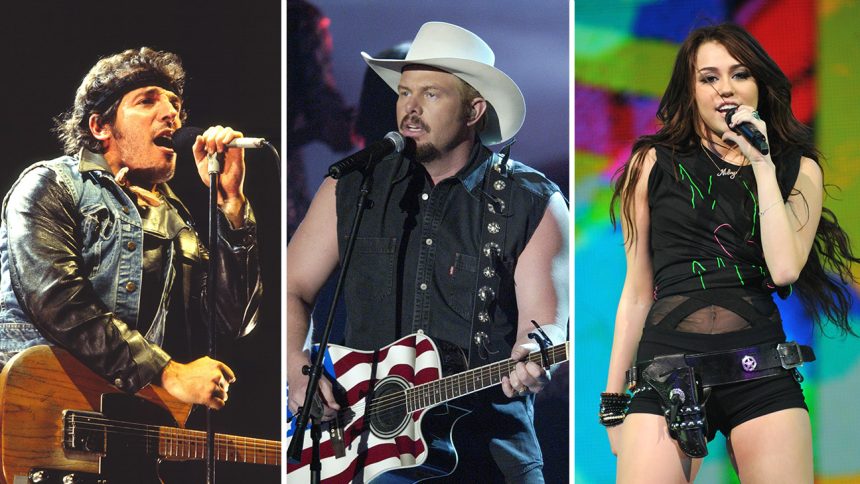From ‘Party in the U.S.A.’ to ‘Born in the U.S.A.’: 20 of America’s Most Patriotic (and Un-Patriotic) Musical Offerings
Throwing a big bash for the Fourth of July and need a themed playlist?
The Hollywood Reporter has rounded up a list of songs about the good ole U.S.A., from Woody Guthrie’s “This Land Is Your Land” to Lee Greenwood’s “God Bless the USA.”
However, not all of them are exactly patriotic or positive in their view of America and its citizens. Bruce Springsteen’s “Born in the U.S.A.” is often misunderstood as a nationalistic anthem (it actually was intended to draw attention to the negative effects of the Vietnam War), while Green Day’s “American Idiot” is a criticism of the American media.
Read on for more, and click here to see a list of Hollywood’s most patriotic movies.
You Might Also Like
“I was born in the U.S.A., born in the U.S.A./ Got in a little hometown jam/ So they put a rifle in my hand”
Though it is often misunderstood as a nationalistic anthem, Bruce Springsteen intended the song to call attention to the negative effects of the Vietnam War and how veterans were treated after they returned home.
“I don’t know if anybody could imagine what [Vietnam War veterans’] particular experience is like,” Springsteen told Rolling Stone in 1984. “I don’t think I could, you know? I think you had to live through it. But when you think about all the young men and women that died in Vietnam, and how many died since they’ve been back — surviving the war and coming back and not surviving — you have to think that, at the time, the country took advantage of their selflessness. There was a moment when they were just really generous with their lives.”
The song ranked 275th on the Rolling Stone’s “500 Greatest Songs of All Time.”
“New York to East California. /There’s a new wave coming I warn you. /We’re the kids in America.”
Though the song says different, Kim Wilde was not actually a kid in America. She grew up in west London, the daughter of rocker Marty Wilde, who wrote the song with son Ricky.
“My dad’s head went into a fantasy, this idea of everything being better in America,” Kim once said of the meaning behind the tune. “Of course for his generation, that was very true. Everyone was going to drive in movies and drinking milkshakes and having hamburgers in America. We weren’t doing things like that in the U.K. I think a lot of that got caught up in the lyrics — all the kids in America are having a better, more interesting, more dangerous time than we were here.”
“Some folks are born made to wave the flag/ Ooh, they’re red, white and blue/ And when the band plays ‘Hail to the chief’/ Ooh, they point the cannon at you, Lord”
Creedence Clearwater Revival lead singer John Fogerty told Rolling Stone that the song was inspired by David Eisenhower, grandson of President Eisenhower, and Julie Nixon, the daughter of President Nixon, saying, “you just had the feeling that none of these people were going to be involved with the [Vietnam] war.”
“Little ditty about Jack and Diane/ Two American kids growin‘ up in the heartland”
According to John Mellencamp (then performing as John Cougar), “Jack & Diane” was written about a relationship he had with a girl who lived near his hometown of Seymour, Indiana.
“Oh, but ain’t that America/ For you and me/ Ain’t that America/ Something to see, baby/ Ain’t that America /Home of the free, yeah/ Little pink houses/ For you and me.”
John Mellencamp (then performing as John Cougar Mellencamp) has said the song is actually a critique on American life, not a celebration. The chorus (above) is meant to be sarcastic.
“This one has been misconstrued over the years because of the chorus — it sounds very rah-rah. But it’s really an anti-American song,” Mellencamp has said. “The American Dream had pretty much proven itself as not working anymore. It was another way for me to sneak something in.”
“Let freedom ring, let the white dove sing/ Let the whole world know that today/ Is a day of reckoning/ Let the weak be strong, let the right be wrong/ Roll the stone away, let the guilty pay/ It’s Independence Day”
It sounds like a patriotic anthem, but it’s more of an empowering message of how an a woman escaped her abusive husband after setting her house on fire — thereby getting her own “independence day.” However, after it was released, many folks didn’t get the meaning of the song.
“Some people just don’t understand what the song is about at all,” singer Martina McBride has said.
However, the song has had an impact on victims of domestic violence. “I started getting all these letters — handwritten letters, back in the day — from women saying, ‘This is my song,’” McBride said. “I got a few letters that said, ’I heard this song on the radio, I’ve been battered for 10 years, and I left. This was the thing that made me realize that it’s not my fault, that I need to make a change.’”
“And the rocket’s red glare, the bombs bursting in air/ Gave proof through the night that our flag was still there/ O say does that star-spangled banner yet wave/ O’er the land of the free and the home of the brave?”
Francis Scott Key’s tune is, for obvious reasons, as patriotic as you can get. America’s National Anthem has been sung by scores and scores and scores of famous faces at sporting events, military celebrations, graduations and much more.
But the most famous rendition might belong to Whitney Houston, who performed it in January 1991 — just days after the Persian Gulf War started — at Super Bowl XXV in Tampa, Florida. Due to public demand, Arista Records then released a single of her performance, with proceeds donated to the American Red Cross Gulf Crisis Fund.
Houston said of her performance at the Super Bowl: “If you were there, you could feel the intensity. You know, we were in the Gulf War at the time. It was an intense time for a country. A lot of our daughters and sons were overseas fighting. I could see, in the stadium, I could see the fear, the hope, the intensity, the prayers going up, you know, and I just felt like this is the moment. And it was hope, we needed hope, you know, to bring our babies home and that’s what it was about for me, that what I felt when I sang that song, and the overwhelming love coming out of the stands was incredible.”
After the September 11 attacks, Arista rereleased the song, with proceeds donated to firefighters and victims of the terrorist attacks.







